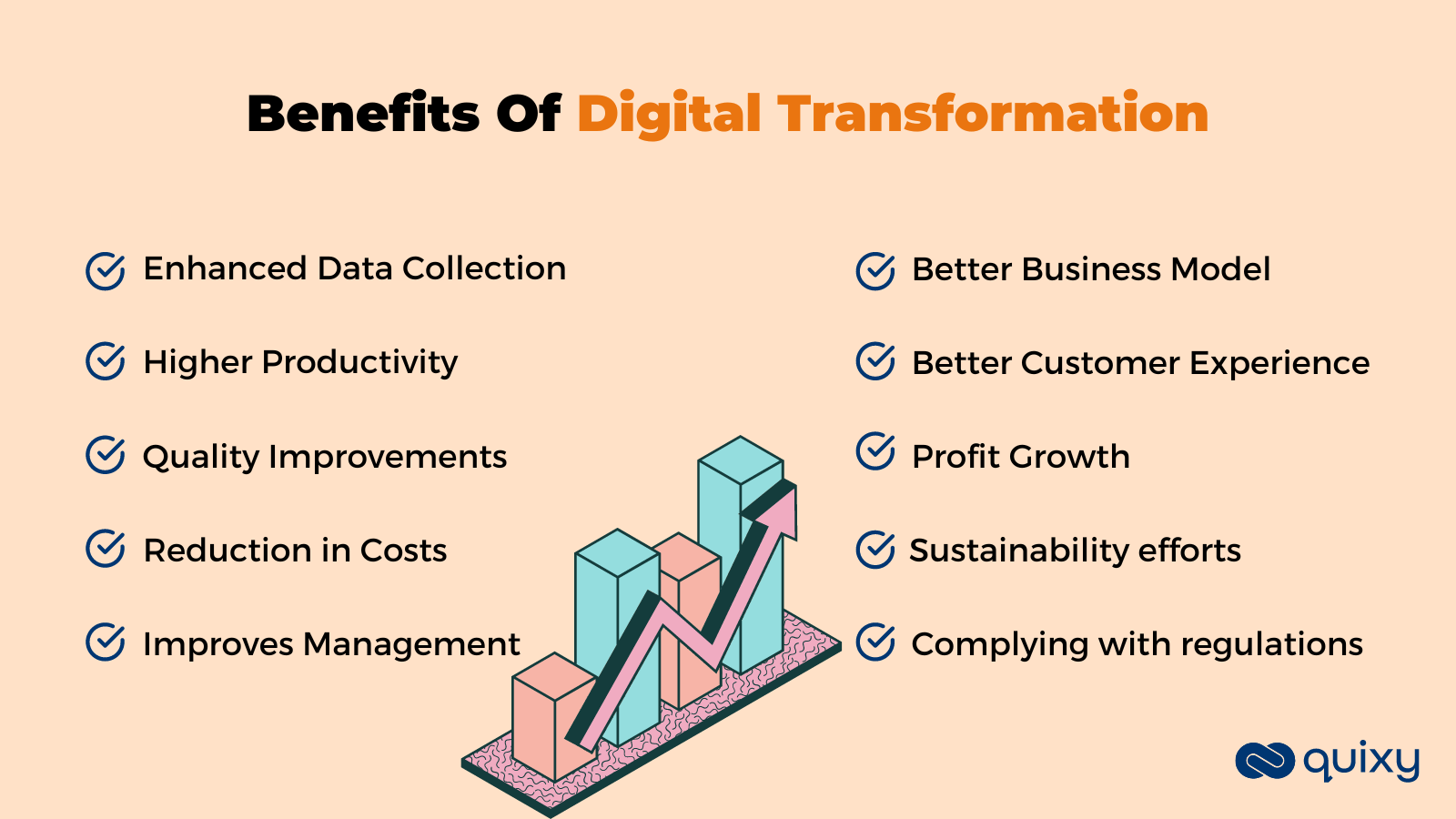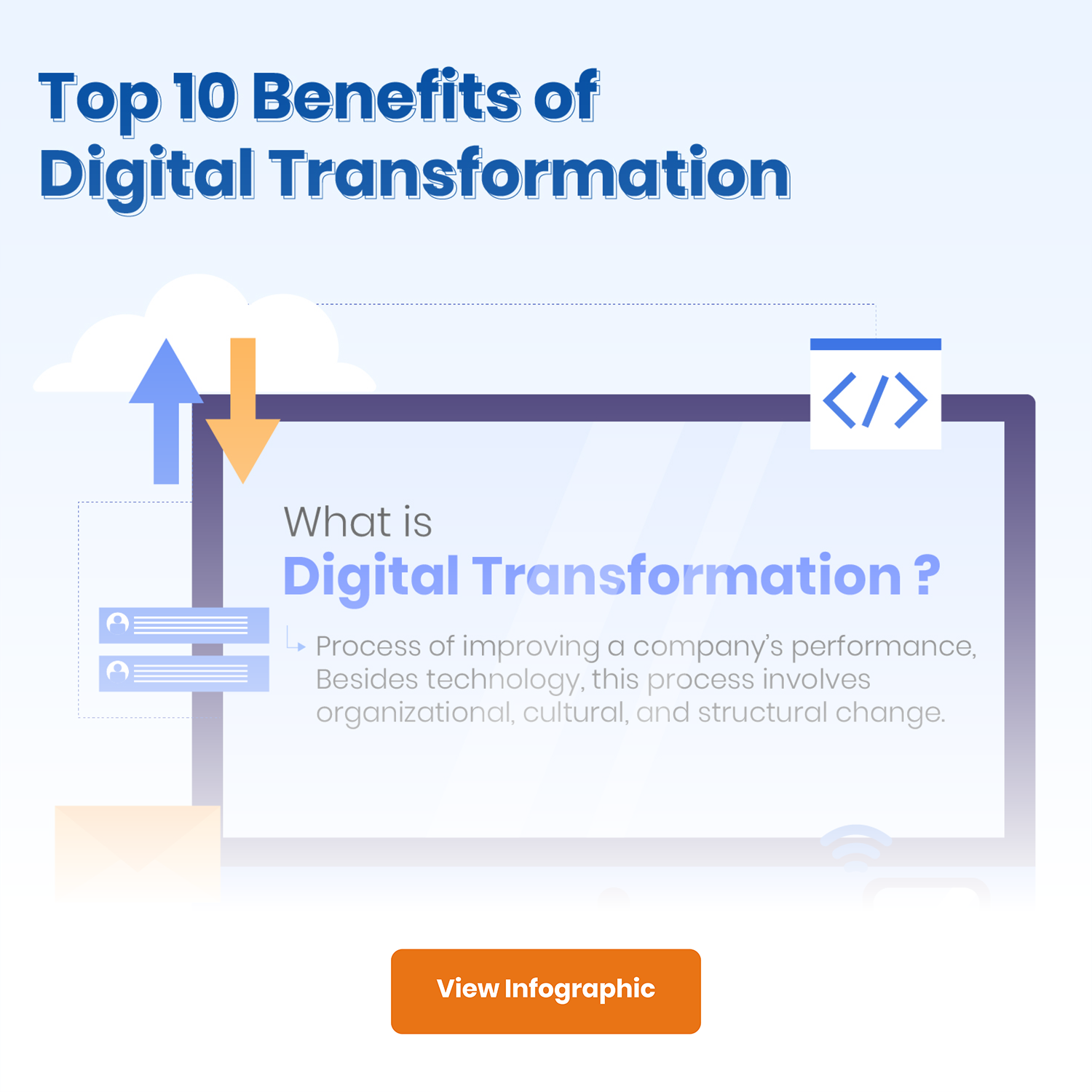
Survival of the fittest held true in the last couple of years for organizations. Only digitally mature organizations that have benefited from digital transformation could manage and make rapid adjustments to allow their employees to work from their safe spaces.
Most organizations were compelled to make quick decisions concerning digital technology implementation to accelerate their digital transformation route and take advantage of its full potential.
Organizations can improve their operations through digital transformation. A core digital transformation strategy must be implemented across all areas of an organization that utilizes digital technology to transform business models or processes.
The market size for digital transformation is anticipated to experience a compounded annual growth rate of 19.1%, surging from $521.5 billion in 2021 to a substantial $1.275 trillion by 2026.
This article explores the benefits of digital transformation for business and offers ways to get there faster.
What is Digital Transformation?
Digital transformation is the process of improving a company’s performance by changing how it does business. Besides technology, this process involves organizational, cultural, and structural change.
New technologies and competitors with different business models have disrupted industries in the digital era. Companies must transform themselves in this scenario with digital transformation trends to remain competitive.
The digital transformation of a business is essential in today’s digital world to introduce new products, attract new customers, and grow into different markets. Digitized data allows organizations to understand better how they operate and what needs to be improved by analyzing them.
It is a continuous process, not a one-time event. In addition, it introduces new business models and changes how businesses are conducted. This will help ensure that the end consumer is satisfied, which is the whole point of business.

Why is Digital Transformation Important?
An organization’s operating model changes as a result of digital Transformation. This process involves systems, processes, workflows, and cultures. As a result of this transformation, an organization’s data is brought together across areas more effectively.
- Efficiency and Productivity: Streamlines operations, reduces inefficiencies, and optimizes resources, leading to increased productivity.
- Enhanced Customer Experience: Offers personalized experiences, quicker responses, and tailored solutions, boosting customer satisfaction.
- Innovation and Competitiveness: Encourages innovation, rapid adaptation to market changes, and the introduction of novel offerings.
- Data-Driven Insights: Collects and analyzes data for informed decision-making, identifying trends and growth opportunities.
Automating workflows and using advanced processing, such as artificial intelligence (AI) and machine learning (ML), allow companies to connect the dots on the customer journey in a new way.
Also Read: Digital Transformation in Insurance
Benefits of Digital Transformation
The following are the key benefits of digital transformation.

Enhanced data collection
Today’s data-driven world requires all organizations to acquire large amounts of data. Analyzing this data and gaining insights from it is the real benefit of this acquisition. The user organization can then use these actionable insights to improve its decision-making process. By integrating data acquisition with business intelligence capabilities, digital transformation can create a system capable of integrating both.
By doing so, the various departments of the user organization can interpret the data according to their needs. This allows for an easy design of a unified view of various business operations.
Higher level of efficiency and productivity
Through digital technologies, processes can be sped up, and operations can be streamlined to increase efficiency and productivity. Robotic process automation, for example, can outperform humans by a multiplicity of factors.
For instance, IBM demonstrated that bots could complete tasks 20 times faster than humans and rarely make errors. The speed and accuracy with which business intelligence software and data analytics tools can collect and analyze data are unmatched by humans. With the help of advanced technologies, workers can then make faster decisions.
Also Read: What are the Components of Digital Transformation?
Quality improvements to products and services
In any market, product and service quality are clear differentiators. By implementing digital transformation strategies and technologies, businesses can reduce rework and scrap, increase traceability and consistency for data management throughout the value chain, and improve first-time fix rates.
Software like product lifecycle management (PLM) can enhance quality improvement and provide access to the most accurate data to stakeholders across the organization (or product lifecycle).

Reduction in costs
Many organizations spend a lot of time and money maintaining old, legacy systems. Through the integration of more efficient processes and quicker problem identification, a digital transformation could save not only you money upfront but also time. It is one of the very crucial business benefits of digital transformation.
It is also possible to save money in general operations with the right ERP software. For example, a company specializing in products can better understand raw material volume requirements and timelines, and cost savings are inevitable when raw materials are ordered strategically based on data.
Improved management of resources
Information and resources are consolidated into a suite of tools for business through digital Transformation. It consolidates company resources and reduces overlap between vendors rather than using dispersed software and databases. Enterprise businesses are using an average of 900 applications. Integrating applications, databases, and software into a central business intelligence repository through digital transformation is possible.
There is no department or functional unit that is responsible for digital transformation. It has the potential to improve efficiency and innovation in all areas of a business. Every department handles sensitive data, from sales and marketing to finance and the executive suite. Data must be optimized and secured as it travels, and teams must be equipped with easy-to-use tools to accomplish their tasks.
Also Read: Mastering Digital Organization: A Guide to Thriving in a Tech-Driven World
Better business model
The ability to modernize your organization’s services is one of the main benefits of digital transformation.
Due to advances in digital technology, companies such as Netflix and Spotify can provide services to millions of consumers.
As a result of effective technology adoption, new business models will emerge that will enable businesses to serve consumers through a wide range of channels, thereby increasing their market share and profit margins.
Providing a better customer experience
Most digital transformation headlines focus on internal benefits. However, companies must also consider (and prioritize) how their efforts will impact the customer experience. How will the transformational changes within the business benefit the customer – better service? A higher level of quality?
Is there a need for innovative products or features? A faster delivery time? These are just a few examples of possible outcomes. Businesses can identify a solid starting point for digital transformation initiatives by analyzing customer pain points and feedback.
In addition to digital transformation, closed-loop engineering is another option, which allows product developers to make design improvements faster and more aligned with customer preferences through real-time product performance and usage data. Providing better customer experience has to be the best of the benefits of digital transformation.
Also Read: A Comprehensive Glossary of Digital Transformation Terms
Profit growth
One of the most important benefits of digital transformation improves efficiency and profitability for companies. According to SAP Center for Business Insights and Oxford Economics:
- Organizations that have completed digital transformations report increased profits in 80% of cases.
- Market share has increased for 85% of companies.
- The average revenue growth of leaders is 23% higher than that of competitors.
Also Read: How Quixy Can Help You with Digital Transformation?
Contribute to sustainability efforts
To achieve a more sustainable future, digital tools will be used in the design and engineering of products. Digital Transformation has a significant impact in two key areas.
It is first critical to keep in mind that decisions in engineering lock in carbon footprint impact in downstream stages such as manufacturing, use, service, and disposal. Engineers carefully consider materials, processes, and logistics by using digital technologies such as CAD, simulation, PLM, IoT, and more.
As a result of this upfront work, we can reduce material and energy consumption, lower emissions, and reduce waste throughout the product’s lifecycle. This is from manufacturing to service to the end of its useful life.
Second, companies are increasingly focusing on sustainable manufacturing and service – how can they reduce emissions across their business operations? Companies are gaining more significant insights into inefficiencies through IoT and digital performance management technologies and making data-driven decisions that optimize operations and maximize resource efficiency.
Also Read: 9 Essential Tips for Optimizing No-Code Platform Capabilities
Complying with regulations
A growing number of manufacturers comply with regulatory requirements across various industries. There may be regulations on greenhouse gas emissions, safety, quality, distribution, or other industry-specific requirements.
This requires companies to have increased visibility and access to data about their products, processes, and performance. This type of transformation is supported by two key technologies: PLM for hardware and application lifecycle management (ALM) for software. For achieving regulatory compliance, they are the backbone of product development strategies.
Also Read: Digital Transformation in HR
Improved Agility and Adaptability
Businesses today must be highly agile to stay ahead of rapid market changes and industry disruptions. The ability to quickly adjust strategies in real time ensures resilience and continuous growth. By leveraging data-driven insights and automation, organizations can make faster, more informed decisions, optimizing workflows for maximum efficiency. This adaptability allows companies to pivot operations, restructure processes, and embrace new opportunities with minimal friction, ensuring they remain competitive in an evolving landscape.
Global Reach and Market Expansion
The digital era has eliminated geographical barriers, enabling businesses to reach new markets and audiences with ease. Online platforms facilitate cross-border commerce, allowing companies to expand their presence without the need for a physical footprint. By leveraging localized marketing strategies and AI-powered insights, businesses can tailor their offerings to diverse customer segments, increasing engagement and conversions. Also, digital collaboration tools enhance international partnerships and supply chain efficiency, further driving seamless global operations.
Scalability and Flexibility
A scalable business model is essential for sustainable growth, and digital transformation makes it easier than ever to scale operations up or down based on real-time demand. Cloud computing, automation, and AI-driven resource management ensure businesses can handle seasonal fluctuations efficiently without incurring unnecessary costs. The ability to quickly integrate emerging technologies into existing workflows enhances flexibility, allowing organizations to adapt to industry trends while maintaining operational efficiency.
Improved Customer Retention
Customer loyalty is built on personalized experiences and proactive engagement. By utilizing AI and predictive analytics, businesses can anticipate customer needs, offering tailored solutions that enhance satisfaction. Loyalty programs, omnichannel support, and data-driven marketing strategies help create meaningful connections, fostering long-term relationships. A seamless and consistent customer experience across digital touchpoints ensures higher retention rates, positioning businesses as trusted brands in their respective industries.
Reduced Time-to-Market
Speed is a critical factor in today’s competitive landscape, and businesses that can bring products to market faster have a significant advantage. Agile development methodologies, automation, and no-code/low-code platforms streamline product creation and deployment, reducing delays. Digital process optimization eliminates bottlenecks, enabling iterative innovation and faster prototyping based on real-time customer feedback. Additionally, enhanced supply chain visibility and predictive analytics further accelerate product availability, ensuring businesses meet market demands efficiently.
Competitive Differentiation
Standing out in a crowded market requires innovation and unique value propositions. Businesses leveraging AI, blockchain, and IoT can create cutting-edge solutions that redefine customer experiences. A strong digital presence, backed by automation-driven efficiency and AI-powered personalization, establishes a brand’s reputation as an industry leader. Continuous improvement, driven by data insights, allows organizations to refine their offerings, ensuring they stay ahead of competitors and consistently meet evolving consumer expectations.
Digital Transformation with No-Code: Empowerment, Simplicity, and Limitless Possibilities
Get ready to experience the extraordinary power of no-code in your digital transformation journey! No-code tools and platforms empower you to create remarkable applications, automations, and workflows without any coding expertise. Say goodbye to the complexities of programming and hello to intuitive visual interfaces and drag-and-drop functionalities.
With no-code, you can accelerate innovation, enhance agility, and increase productivity. Seamlessly integrate with existing systems, unleash cross-functional collaboration, and empower citizen developers within your organization. It’s time to unleash your creativity, bring your ideas to life, and embark on a magical adventure of digital transformation. Say “abracadabra” to traditional barriers and embrace the simplicity, speed, and limitless possibilities of no-code. Get ready to transform your business and create a future that is truly enchanting.
Also Read: Most Mind-Blowing Examples of Digital Transformation
Conclusion
All kinds of industries are increasingly adopting digital transformation, but integrating all internal systems into a systematic workflow is a big challenge. Nevertheless, digitalization is also refining the operational structures of organizations across various industries.
Digital Transformation today offers several highly beneficial features. When digital Transformation is successful, one or more of the outlined benefits are quantifiable.
Quixy is a no-code digital transformation platform that enables users to create applications without writing code. You need a fast-paced tool to get you started in the fast-changing business environment. Get Started Today! Empower your organization with automation and customized app development without coding.
Frequently Asked Questions (FAQs)
Q. What is digital transformation & why is it important?
Digital transformation is the process of deployment of digital technologies across all aspects of an organization, resulting in fundamental changes to its operations and value proposition. Embracing innovation, enhancing efficiency, and meeting dynamic customer demands is essential for businesses to remain competitive in the digital era. Through digital transformation, organizations can optimize processes, increase adaptability, and harness data-driven insights to make more informed decisions.
Q. How does digital transformation enhance productivity and efficiency?
Digital transformation improves productivity and efficiency by automating manual processes, eliminating paper-based workflows, and enabling real-time collaboration. By leveraging digital tools and technologies, organizations can streamline operations, reduce manual errors, and optimize resource allocation.
Q. How digital transformation improves customer experience?
Digital transformation enhances the customer experience by providing seamless, personalized, and convenient interactions across various touchpoints. It enables organizations to deliver targeted marketing messages, personalized recommendations, and tailored customer service.
Q. Does digital transformation drive innovation in organizations?
Yes, digital transformation is a catalyst for innovation within organizations. By adopting digital technologies, businesses can explore new business models, develop innovative products and services, and tap into new market opportunities.
Q. What are the benefits of data-driven decision-making?
One of the critical benefits of digital transformation is the ability to make data-driven decisions. Data-driven decision-making allows organizations to identify patterns, trends, and correlations, resulting in more precise forecasting, targeted marketing campaigns, optimized allocation of resources, and improved operational efficiency.
Q. How does digital transformation improve collaboration & communication?
Digital transformation fosters improved collaboration and communication by providing digital platforms and tools that enable seamless sharing of information, real-time communication, and remote collaboration. Cloud-based collaboration platforms, project management tools, and instant messaging applications facilitate teamwork and enhance productivity.
Q. What are the challenges or risks of digital transformation?
Yes, digital transformation comes with its share of challenges and risks. Common challenges include resistance to change, cultural barriers, legacy systems integration, and cybersecurity threats. It is vital for firms to develop a comprehensive strategy, address these challenges proactively, and implement robust security measures to mitigate risks during the digital transformation journey.
Subscribe
Login
Please login to comment
0 Comments
Oldest
















